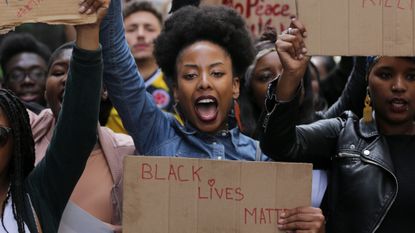Is BAME an ‘unhelpful’ term?
BBC abandons acronym in newsrooms and corporate communications

Four UK broadcasters will no longer use the acronym “BAME” to describe black, Asian and minority ethnic people after an industry report found there was a “lack of trust” around the term.
The BBC, ITV, Channel 4 and Channel 5 will follow the findings from the Sir Lenny Henry Centre for Media Diversity, which said that the collective term had been used to “hide failings in the representation of specific ethnic groups”.
The term will be ditched in favour of the use of “more specific terms to describe ethnicity”, as recommended in the industry report, in order to “provide better representation and to boost diversity by acknowledging the unique experiences of people from different ethnic backgrounds”, said the BBC.
Subscribe to The Week
Escape your echo chamber. Get the facts behind the news, plus analysis from multiple perspectives.

Sign up for The Week's Free Newsletters
From our morning news briefing to a weekly Good News Newsletter, get the best of The Week delivered directly to your inbox.
From our morning news briefing to a weekly Good News Newsletter, get the best of The Week delivered directly to your inbox.
Broadcasters will no longer use the term in newsrooms or in corporate communications although it may still be used in “reported speech and official documents”, but will be “accompanied by an explanation i.e. specific information on a particular ethnic group not being available”.
The term, which has become increasingly popular in recent years, is now often seen to be outdated and offensive.
In March, the independent Commission on Race and Ethnic Disparities, launched by Boris Johnson after the Black Lives Matter protests last July, recommend scrapping the label as one of its “key proposals”, reported The Telegraph.
The commission found that the term BAME is “unhelpful and redundant” and should no longer be used by public bodies and companies.
It advised the prime minister to drop the “blanket term”, warning that it “masks the much more complicated picture of different lived experiences of individual ethnic groups”.
Rather, the term “ethnic minority” was found to be more popular among people from ethnic minority backgrounds than BAME or “people of colour”.
The report also highlighted concerns that “companies increasing the number of BAME staff they hire then feel there is no need to tackle other systemic racial problems, inadvertently curbing progress”, reported The Telegraph.
One insider told the newspaper: “The commission has taken evidence from across the UK, examined the data to create a rigorous fact-based report on what is often a highly charged debate.
“It was important for commissioners to produce findings based on data and evidence to try and take down the temperature on this issue and have a debate based on the facts, not driven by ideology.”
The Times said critics of the recommendation “might question whether efforts to increase diversity will be complicated by the lack of a single, clear term to track progress”.
At the time, shadow foreign secretary David Lammy, told Sky News: “I think there is a call to move away from it [the term BAME]. The question is what do you replace it with?”
Nazir Afzal, a former chief crown prosecutor, tweeted that, although he “never liked” the term BAME, “simply stopping its use doesn’t deal with specific issues encountered by minorities”. He accused the government of focusing on “symbols and not substance”.
Sajid Javid, however, seemed to welcome the new proposals, telling LBC’s Nick Ferrari that he “never particularly liked using the word” and the report shows the government is “taking these issues very seriously”.
“It’s a catch-all that doesn’t distinguish between some of the differences between different ethnic minority groups,” he said.
Johnson announced the creation of the commission after the death in the US of George Floyd, a black man who was killed in May 2020 when a white police officer used his knee to pin him to the ground by his neck.
Floyd’s death sparked a wave of protests across the US and around the world, prompting fresh debate over how to tackle racial inequalities.
Create an account with the same email registered to your subscription to unlock access.
Sign up for Today's Best Articles in your inbox
A free daily email with the biggest news stories of the day – and the best features from TheWeek.com
Sorcha Bradley is a writer at The Week and a regular on “The Week Unwrapped” podcast. She worked at The Week magazine for a year and a half before taking up her current role with the digital team, where she mostly covers UK current affairs and politics. Before joining The Week, Sorcha worked at slow-news start-up Tortoise Media. She has also written for Sky News, The Sunday Times, the London Evening Standard and Grazia magazine, among other publications. She has a master’s in newspaper journalism from City, University of London, where she specialised in political journalism.
-
 Who actually needs life insurance?
Who actually needs life insurance?The Explainer If you have kids or are worried about passing on debt, the added security may be worth it
By Becca Stanek, The Week US Published
-
 Sexual wellness trends to know, from products and therapies to retreats and hotels
Sexual wellness trends to know, from products and therapies to retreats and hotelsThe Week Recommends Talking about pleasure and sexual health is becoming less taboo
By Theara Coleman, The Week US Published
-
 Is the AI bubble deflating?
Is the AI bubble deflating?Today's Big Question Growing skepticism and high costs prompt reconsideration
By Joel Mathis, The Week US Published
-
 Is the Gaza war tearing US university campuses apart?
Is the Gaza war tearing US university campuses apart?Today's Big Question Protests at Columbia University, other institutions, pit free speech against student safety
By Joel Mathis, The Week US Published
-
 Is there a peaceful way forward for Israel and Iran?
Is there a peaceful way forward for Israel and Iran?Today's Big Question Tehran has initially sought to downplay the latest Israeli missile strike on its territory
By Sorcha Bradley, The Week UK Published
-
 How could the Supreme Court's Fischer v. US case impact the other Jan 6. trials including Trump's?
How could the Supreme Court's Fischer v. US case impact the other Jan 6. trials including Trump's?Today's Big Question A former Pennsylvania cop might hold the key to a major upheaval in how the courts treat the Capitol riot — and its alleged instigator
By Rafi Schwartz, The Week US Published
-
 Is the next cold war a drone-swarm race between US and China?
Is the next cold war a drone-swarm race between US and China?Today's Big Question Both global superpowers are building up their capacity for surging robotic warfare. What happens next is anyone's guess.
By Rafi Schwartz, The Week US Published
-
 How powerful is Iran?
How powerful is Iran?Today's big question Islamic republic is facing domestic dissent and 'economic peril' but has a vast military, dangerous allies and a nuclear threat
By Harriet Marsden, The Week UK Published
-
 Why are Republicans trying to change Nebraska's Electoral College vote?
Why are Republicans trying to change Nebraska's Electoral College vote?Today's Big Question It's a chance for Donald Trump to block Joe Biden's path to re-election
By Joel Mathis, The Week US Published
-
 Is it time to end arms sales to Israel?
Is it time to end arms sales to Israel?Today's Big Question Democrats urge restrictions following World Kitchen convoy deaths
By Joel Mathis, The Week US Published
-
 Have we entered the age of AI warfare?
Have we entered the age of AI warfare?Today's Big Question Israeli military used AI to create 'kill lists' of suspected Hamas militants, say local media
By Sorcha Bradley, The Week UK Published